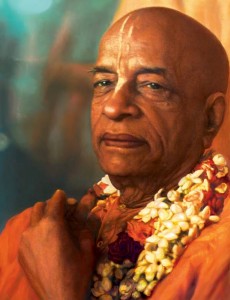Founder-Acharya
Srila Prabhupada Biography
COPYRIGHT NOTICE:
This is an evaluation copy of the printed version of this book, and is NOT FOR RESALE. This evaluation copy is intended for personal non-commercial use only, under the “fair use” guidelines established by international copyright laws. You may use this electronic file to evaluate the printed version of this book, for your own private use, or for short excerpts used in academic works, research, student papers, presentations, and the like
For millennia the teachings and the rich culture of bhakti-yoga, or Krishna Consciousness, had been hidden within the borders of India. Today, millions around the globe express their gratitude to Srila Prabhupada for revealing the timeless wisdom of bhakti to a world.
Born as Abhay Charan De on September 1, 1896, in Calcutta, as a young man he joined Mahatma Gandhi’s civil disobedience movement. In 1922, a meeting with the prominent scholar and spiritual leader, Srila Bhaktisiddhanta Sarasvati, proved to be most influential on young Abhay’s future calling.
Srila Bhaktisiddhanta was a leader in the Gaudiya Vaishnava community, a monotheistic tradition within the broader Hindu culture. At their very first meeting, Srila Bhaktisiddhanta asked Abhay to bring the teachings of Lord Krishna to the English-speaking world. Deeply moved by his devotion and wisdom, Abhay became a disciple of Srila Bhaktisiddhanta in 1933, and resolved to carry out his mentor’s request. Abhay, later known by the honorific A.C. Bhaktivedanta Swami Prabhupada, spent the next 32 years preparing for his journey west.
In 1965, at the age of sixty-nine, Srila Prabhupada begged a free passage and boarded a cargo ship, the Jaladhuta, to New York. The journey proved to be treacherous and he suffered two heart attacks aboard. After 35 days at sea, he first arrived at a lonely Brooklyn pier with just seven dollars in Indian rupees and a crate of his translations of sacred Sanskrit texts.
In New York, he faced great hardships and began his mission humbly by giving classes on the Bhagavad-gita in lofts on the Bowery and leading kirtan (traditional devotional chants) in Tompkins Square Park. His message of peace and goodwill resonated with many young people, some of whom came forward to become serious students of the Krishna-bhakti tradition. With the help of these students, Bhaktivedanta Swami rented a small storefront on New York’s Lower East Side to use as a temple.
In July of 1966, Bhaktivedanta Swami established the International Society for Krishna Consciousness (ISKCON) for the purpose he stated of “checking the imbalance of values in the world and working for real unity and peace”.
In the eleven years that followed, Srila Prabhupada circled the globe 14 times on lecture tours spreading the teachings of Lord Krishna. Men and women from all backgrounds and walks of life came forward to accept his message. With their help, Srila Prabhupada established temples, farm communities, a publishing house, and educational institutions around the world. And, he began what has now become the world’s largest vegetarian food relief program, Hare Krishna Food for Life.
With the desire to nourish the roots of Krishna consciousness in its home, Srila Prabhupada returned to India several times, where he sparked a revival in the Vaishnava tradition. In India, he opened dozens of temples, including large centers in the holy towns of Vrindavana and Mayapura.
Source: www.iskcon.org

